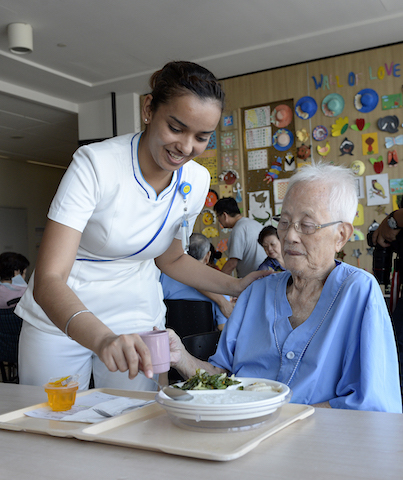Studying nutritional deficiencies in elderly
Asia’s largest clinical study will help establish nutritional standards for the elderly.
BY: Eleanor Yap

Under-nutrition in older adults is a common condition that can affect up to 35 percent of community-dwelling elderly who are admitted to hospital. This is CGH data from patients coming into its hospital.
Changi General Hospital (CGH) and Abbott have set up a Nutritional Health for the Elderly Reference Centre (NHERC) in CGH in Singapore. The first task of the Centre, which is located at the Integrated Centre, is to conduct Asia’s largest clinical study to evaluate the effects of nutrition management in the elderly in Singapore. The Centre is currently in the midst of recruiting some 1,200 community-dwelling elderly living in the East area, who are aged 65 years and above, ambulant, clinically-healthy or with well-managed chronic disease including hypertension, chronic obstructive pulmonary disease, and cardiovascular disease.
The study, where CGH and Abbott will work with SingHealth Polyclinics (SHP), will investigate the effects of nutritional supplementation in not only improving health outcomes, but also reducing hospital readmission rate and length of stay among the elderly with nutritional deficiency aged 65 and above in Singapore. They will also be establishing nutrition standards for the elderly in Asia and developing new products tailored to Asian preferences and needs.
Under-nutrition’s ripple effect
Explaining the situation, Adj Prof Samuel Chew, senior consultant, Department of Geriatric Medicine at CGH, said: “Under-nutrition in older adults is a common condition that can affect up to 35 percent of community-dwelling elderly who are admitted to hospital (this is CGH data from patients coming into its hospital). Under-nutrition has a ripple effect on individuals and the healthcare system at large as it puts patients at increased risk for complications such as infections, muscle loss, longer hospital stays, and increase chances of readmission.”
Added Magdalin Cheong, head deputy director, Dietetic and Food Services, CGH, if older persons have depression, they may not want to eat or they may forget to eat, or if they are in a hospital, they may not want to eat because of changes to their environmental. Nutrition then is affected and when this happens, their weight decreases, and their muscle mass and strength are affected. She explained that all this increases the risk of falls, prolonged hospitalisation, increased healthcare costs, etc. She said that we do not want another problem to be added to their other chronic problems. “We want to improve nutritional intakes, get them to stay healthy in their homes and communities, and reduce healthcare costs,” she said.
Under-nutrition is however, not an inevitable side effect of ageing, but many changes associated with the process of ageing can cause poor nutrition. For example, ageing is frequently associated with decreases in taste acuity and smell, deteriorating dental health, and decreases in physical activity, which may affect nutrient intake. Changes such as significant decrease in nutrient intake can lead to nutritional deficiencies, with potentially serious complications.
Unique study

At the recent press conference – from left to right: Lydia Tan, director, Centre for Innovation, CGH; Dr Lee Chien Earn, CEO, CGH; Dr Low Yen Ling, director of R&D, Abbott Nutrition Research & Development Asia Pacific; Magdalin Cheong, head deputy director, Dietetic and Food Services, CGH; Adj Prof Samuel Chew, senior consultant, Department of Geriatric Medicine at CGH; and Dr Tan Ngiap Chuan, director of research, family physician and senior consultant, SingHealth Polyclinics.
The study at the NHERC is important and different from other nutrition studies. Dr Low Yen Ling, director of research and development at Abbott Nutrition, Asia Pacific Centre, shared that the study focuses on community dwellers rather than hospital patients and it looks at how to improve their nutrition and prevent them from coming to the hospital, thereby alleviating the bed shortages in hospitals. It also will generate data from the Asian population rather than the Western population as Asians have different body composition, dietary habits and lifestyle. The study will also help look at the gaps in nutrition standards in Asian elderly, meaning that standards are often established from Western standards such as walking speed and grip strength, and Asians may fall short.
“Under-nutrition is an under-recognised problem,” she emphasised and the study will address this gap. Out of the 1,200 elderly, there will be 400 elderly who are well-nourished, while the remaining 800 who are at risk of under-nourishment, and they will be given oral nutritional supplements and dietary counselling for six months. Shared Dr Low, “Oral nutritional supplements are an effective strategy to improve health outcomes in undernourished elderly.” There will also be follow-ups on the elderly to assess their impact.
Once the findings are released in 2020, Dr Tan Ngiap Chuan, director of research, family physician and senior consultant at SHP, said this could pave the way to possible screening of elderly with nutritional deficiencies. “The study’s findings will have valuable lessons for us.”
After the study is complete, the NHERC will be used as a reference centre for nutrition in the elderly, providing nutritional consultancy services for hospitals and care institutions, nationally and internationally, said Adj Prof Chew.
(** PHOTO CREDITS: Changi General Hospital.)

0 Comments